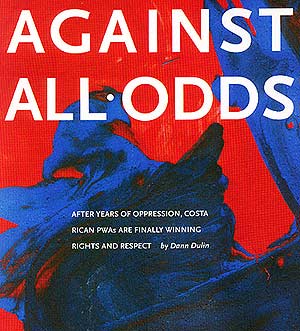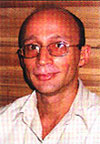 After years of oppression, Costa Rican PWAs are finally winning rights and respect.
After years of oppression, Costa Rican PWAs are finally winning rights and respect.
It is not nice to question authority in Costa Rica. Traditionally, you do what you are told. The problem is not merely rooted in economic factors, but in the repressive, codependent cultural structure which constantly reinforces the need to passivity and conformity. This is intertwined with the impact of the "machista culture" where rigid expectations imply that women are passive and domestic while men are dominant and aggressive. Add to this the main dish of a person with AIDS and you have an emotionally charged issue.
If you have AIDS, your new status and identity in society is victim/leper. AIDS happened to you because you are flawed: homosexual, promiscuous, a prostitute. PWAs lose their social status, their psychological well-being, their economic security, and their physical health. Being a victim means the individual is dependent upon those who don't have AIDS - and who control the victim's destiny. When a person is diagnosed with this much stigmatized disease, it is hardly the time to come forth and proclaim one's rights. One man did, though, with the passionate support of others.
 In September 1997, Guillermo Murillo, a thirty-three-year-old Spanish teacher - who was HIV-positive
for six years and had a T cell count of two - along with two coplaintiffs, won a landmark case. The
CCSS (Caja Costarricense de Seguro Social, similar to America's Social Security system)
was ordered to provide AIDS patients with the antiretroviral cocktail. "This decision
recognizes and affirms that the provision of effective medical care for people affected by AIDS
is an obligation of the Costa Rican State, derived from the concepts of justice and solidarity created
in the area of national health in the Political Constitution and the mission statement of the
CCSS..."(Court Appendix 4).
In September 1997, Guillermo Murillo, a thirty-three-year-old Spanish teacher - who was HIV-positive
for six years and had a T cell count of two - along with two coplaintiffs, won a landmark case. The
CCSS (Caja Costarricense de Seguro Social, similar to America's Social Security system)
was ordered to provide AIDS patients with the antiretroviral cocktail. "This decision
recognizes and affirms that the provision of effective medical care for people affected by AIDS
is an obligation of the Costa Rican State, derived from the concepts of justice and solidarity created
in the area of national health in the Political Constitution and the mission statement of the
CCSS..."(Court Appendix 4).
This arduous path was made possible through ground broken earlier by William Garcia who petitioned a Court Appeal in August 1997 to order the CCSS to provide him with the cocktail recommended by two physicians, Javier Moya and Giscla Herrera. The cocktail consisted of AZT, 3TC, and Crixivan. If purchased separately, the medications would have cost Garcia over $800 per month (the average salary in Costa Rica is $200 per month). Both physicians wrote letters supporting Garcia's petition. At the end of September 1997, the Court decided in his favor, and the drugs were delivered to him three days later. But it was too late for Garcia; his condition worsened and he died several weeks later. Two days after the Court's decision, Murillo petitioned the Supreme Court to order the CCSS to provide the proper medication to all persons with AIDS, not just William Garcia.
Murillo had been part of an active HIV/AIDS support group. "It's not just my work [alone]. There were a lot of people working on this case, giving their ideas, or collecting information. I was just the one who went public." Murillo began drug therapy months before legislation even passed. Since the pills were so expensive, he managed to arrange a two month's supply that was donated by American sources. For the next three months his neighbors raised the money. "This was very important for me. This experience showed me that the neighbors were a very important element for support in this movement. They changed their mentality; there was no prejudice. I felt embarrassed [taking the money] because my neighbors are not rich, and they need the money. But I also felt very proud." he says reflecting. The task of raising money began to take its toll, and provided the impetus that motivated Murillo to take a firm stand.